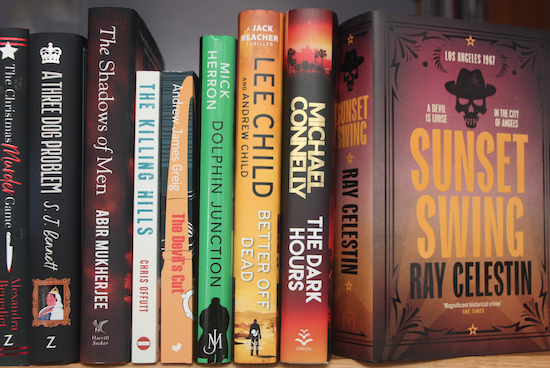Sitting down to write a Christmas murder mystery must be a bit like trying to craft a Christmas single. High risk, but – for those who get it right – potentially vast rewards. Alexandra Benedict is surely in the crime-fiction equivalent category to Slade, Wham, and Mariah. The Christmas Murder Game is one of those gifts you sense will keep on giving (and being given) as new readers discover it and beguiled fans return to it over Christmases yet to come. Benedict has set herself a number of exacting tasks here: pay homage to the classic tropes of the snowed-in country-mansion murder mystery while delivering a twisty, propulsive plot, keeping the reader enthralled and guessing; and, by the way, she’s devised a series of accompanying puzzles for you to solve while you’re following the story.
The action takes place over the twelve days of Christmas, and during each there’s an anagram of the that day’s gift from the song. Also buried in the drifting Yorkshire snows are the titles of a dozen Christmas crime classics, though those ought to be easier – if you know your Christmas crime – as they’re hiding in plain sight. Even the thank-yous are presented as a word search, which contains a hidden song title with a prize on offer to the first person to send proof they’ve found it to her @ak_benedict Twitter account. You’d expect there to be quite a bit of ungainly shoehorning-in going on – lots of “amnesty frown tosh’, “Abba nasty” or “Afrocentrism huts mildew” (answers on a suitably festive postcard) – but what fair takes the breath away is how Benedict has made her list, checked it twice, and done everything on it without the beautiful, frost-crisp writing ever missing a beat.
There’s a Christmas aspect to the second Mick Herron book of the year. Dolphin Junction collects eleven previously published short stories from throughout the winding career of the Slough House creator, one of which features (what shall we call them: a sack? a hohoho? this is a crime-fiction column, so it’s got to be…) a sleigh of Santas at a ghastly outlet mall who discover an imposter in their midst. As well as a typically irascible turn from subs’ bench spymaster Jackson Lamb there’s several very welcome re-appearances by Zoë Boehm, the Oxford-based private detective who starred in Herron’s first four excellent yet oft-overlooked novels.
As with everything he writes, this collection is a delight, each story a compact and elegantly faceted gem, as satisfying and complete as you’d expect from a full-length novel. Perhaps the smaller scale serves to bring one or two techniques into sharper focus. Herron’s facility for drawing humorous insights out of the English language by interrogating and gently mocking well-worn figures of speech feels more prominent here, for instance But none of these pieces, however brief, feels at all unfinished, diminished, or insubstantial. A treat for fans, this collection would be a fine starting point for anyone not yet familiar with his work. Perhaps your own secret (or, at least, suitably mysterious) Santa could be persuaded to pop it in your stocking.
When asked how he knows so much about spies and tradecraft, how he researches the specifics of the clandestine world he depicts with such richness of detail and apparent inside knowledge of language and anecdote, Mick Herron’s response is generally to chuckle and point out that, as a writer of fiction, he makes it all up. Another author who isn’t afraid to tell some surprising truths about the creative process is Lee Child, who allowed the Cambridge academic Andy Martin to spend a year, on and off, looking over his shoulder as he wrote Make Me, the twentieth book in his series featuring former military policeman Jack Reacher. Among the revelations in Martin’s fascinating study Reacher Said Nothing was that Child, in wanting to make the books as exciting for the reader as possible, did his best to ensure his own experience was as close to theirs as he could manage – which meant that, when he’s writing, he doesn’t know what’s going to happen next, either.
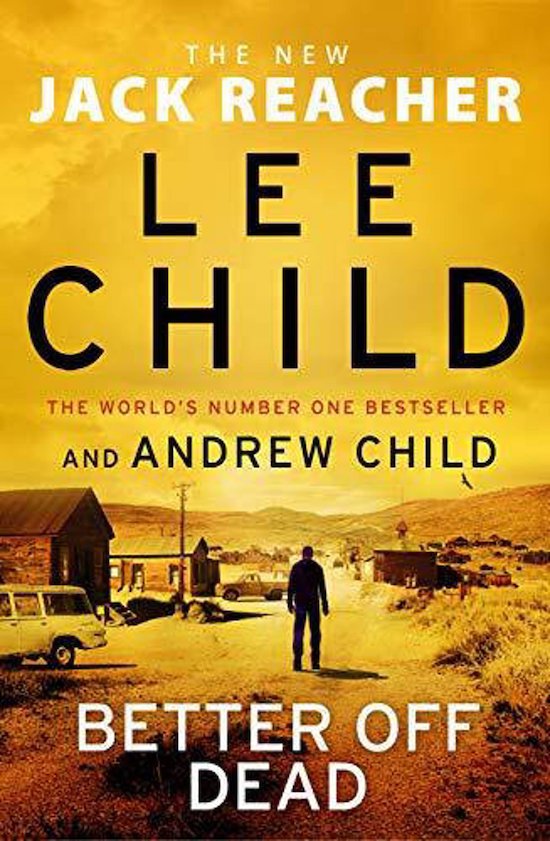
In 2019, Child announced he was going to retire from writing Reacher books, but that the series would continue, and would be written by his brother, Andrew Grant, who’s been renamed Andrew Child while on Reacher duties. We are presently in the middle of a handover period in which both are writing the books together. Last year’s The Sentinel served as something of a reboot, reminding readers that Reacher is a blues fan (in the first book, Killing Floor, the story only happened because he was tracking down the grave of the early blues master Blind Blake) as well as an all-purpose wrecker of bad men’s lives. It featured a brilliant opening sequence in which Reacher turns avenging angel on behalf of a young band, extracting a stolen guitar and unpaid fees from an unscrupulous promoter.
The second collaboration, Better Off Dead, the twenty-sixth book in the series, again plays to reliable Reacher strengths: the quick-witted man-mountain turns up in an out-of-the-way middle-American town, minding his own business, only to find trouble seeks him out (and that half the population shares surnames with denizens of Aston Villa FC). One wonders what Andy Martin might have observed had he been a fly on the wall during the making of this one. What was always a terse style here begins to approach almost James Ellroy territory of telegrammatic punch and pared-down brevity. There are few sentences longer than eight or nine words. This isn’t new, but the intensity of it is is heightened here. The effect is a little dizzying, as if the air other writers leave between sentences and paragraphs has been squeezed out. It seems that the pair are making sure to give us the old Reacher, but with a stylised colour palette, as if in 4K 3D HD – the same as you remember, pretty much what you were expecting, only more so.
Brevity is also one of the many virtues Chris Offutt exhibits in The Killing Hills, a book that shares a few strands of DNA with Child’s series. Offutt’s protagonist is a military policeman and the story is set in a sparsely populated section of rural Kentucky – perhaps terrain more associated with Elmore Leonard, but the kind of place Reacher would turn up in, too. But Offutt’s Mick Hardin is no footloose loner: he’s returned home because he’s bound by some ties that have turned out to be unbreakable, and in the brief period of his life covered by this tightly-focused novel, plenty is at stake and everything carries a very high price.
Offutt writes gently and movingly about the people and the land, the history and the present, and the interior landscapes of his carefully and convincingly wrought characters. He does so with care and precision, speaking plainly to the reader yet always ensuring the description is vivid, the beauty and the dangers never undersold. This is a tight, lean, emotionally uncompromising book that recalls the lapidary beauty of James Lee Burke’s Montana-set novels, the reverberant inner lives of characters explored by George Pelecanos (who brought Offutt on board to co-write an episode of David Simon’s Treme), and the plain-speaking realism of SA Cosby (who provided an enthusiastic cover blurb here), but which is delivered in a distinctive voice all Offutt’s own.
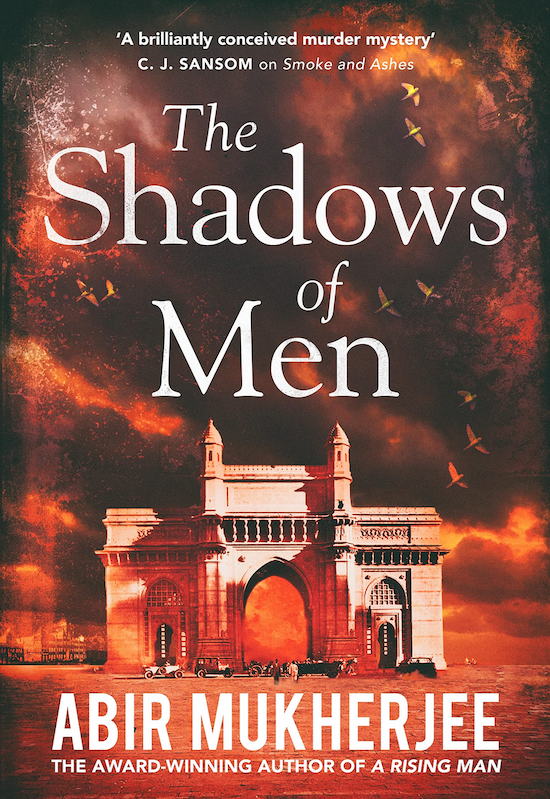
Another singular voice belongs to Abir Mukherjee, though he chooses to speak through his two main characters. In The Shadows Of Men, the fifth novel featuring British police officer Sam Wyndham and his colleague and friend, Surendranath Banerjee, the story is told in alternating chapters from each of their perspectives, the pair criss-crossing a richly rendered evocation of India as it struggles to throw off the boot heel of a teetering British Empire. This is historical fiction of the highest order, and a crime/spy mystery with everything an aficionado of either could want; but it is perhaps the awful timeless resonance of some pervasive background details that hits hardest. Racing through the book in the aftermath of Azeem Rafiq’s testimony to parliament detailing what institutional racism looks and feels like from the inside of a professional sports team in the twenty-first century, you’re reminded how deeply ingrained such a culture of disregard, disrespect and disdain is.
Banerjee and Wyndham are friends, but theirs is a prickly relationship, with both aware of the differences in how the societies and institutions they are part of treat them because of the colour of their skin, their class, and their assumed religious beliefs. Mukherjee plays these themes like a virtuoso, the plot flexing around points where one or the other is able to enter a place or carry out a task or succeed in a negotiation not just because of their own skills and abilities but because of where they come from and what they look like. Yet you leave these excellent books buoyed by a profound sense of optimism; that perhaps, if there’s enough Banerjees and Wyndhams who are willing to work to build strong bonds and effective partnerships despite their differences, that there may yet be some realistic chance of breaking the chains that still yoke us to our pasts.
Institutional racism is one of the themes perhaps unexpectedly explored in A Three Dog Problem, the second of S.J. Bennett’s novels that imagine Queen Elizabeth II as a secret sleuth. It’s always risky to stereotype a group, but we’d hardly be leaping blindly into the void if we were to suggest that relatively few Quietus readers are ardent monarchists. Chances are, therefore, that this isn’t really sounding like it’s going to be your cup of tea – but you really should give it a go. There is a steely edge to Bennett’s writing that cuts through what one might imagine to be the winsome implications of the conceit.
In her telling, HM is shrewd, sharp, and politically decisive, yet shackled as much by convention as unwritten constitution. Her internal monologues are presented almost as a series of despairing sighs: she can see everything that’s going on, has likely come across something similar before in her nine decades so has a fairly decent idea about what’s going to happen, yet despite notionally sitting at the top of the chain of command there’s nothing she can be seen to do herself to prevent things going to hell in a handcart.
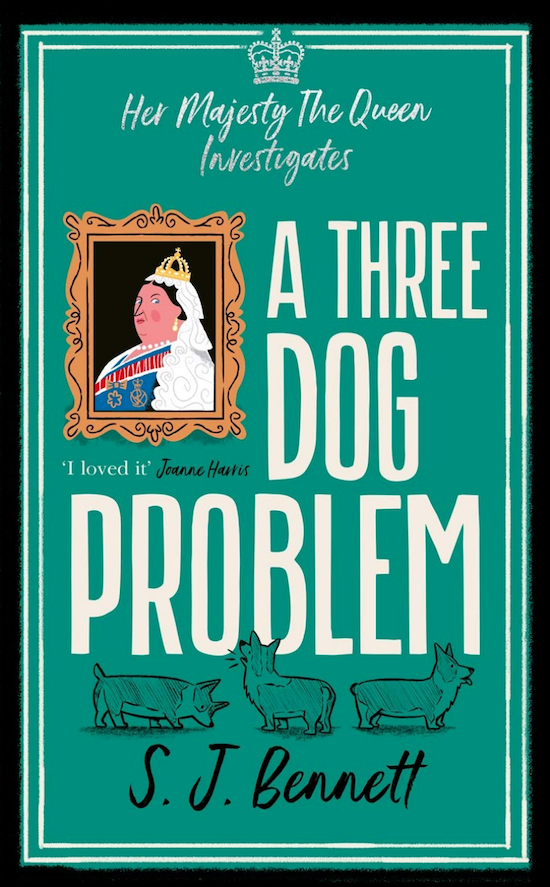
This is an excellent and effective set of believable (rather than artificial and arbitrary) restrictions for a crime writer to place on their main protagonist, but Bennett takes us into more politically adventurous territory by setting the novel amid the real events of 2016 – Brexit referendum, Cameron giving way to May, the rise of Trump. The crimes are entirely imaginary, as are the members of the royal household who the Queen moves like chess pieces as she tries to work out who’s done what to whom and why, but the problems they encounter – stalking, intimidation, social manipulation, sexist and racist abuse – are as real as it gets.
Had the crimes in A Three Dog Problem taken place at Balmoral rather than Buckingham Palace, perhaps the House of Windsor might have called on DI James Corstophine to pop in from what appears to be a fictionalised (though unnamed) Fort William. Following the lauded success of last year’s Whirligig, Andrew James Greig brings his Highlands detective back in The Devil’s Cut, a satisfying blend of gritty procedural and big-horizon rural mood piece. It’s a strong story with credibly complicated characters, but what impresses most is the way Greig weaves town and country, natural and manufactured, past and present into a new and intriguing fabric. There is a lot going on in this book, which starts out in Wicker Man territory before traversing a council-estate-set drug-dealing sub-plot and ending with a set-piece elevated showdown that carries echoes of Holmes and Moriarty at the Reichenbach Falls.
We close this selection with two books that are set in Los Angeles at the end of the year. Both are the fourth books in their respective series, though neither require readers to have read the preceding three; and despite their stories taking place fifty years apart, both share a sense of the city standing at the edge of the world, teetering on the brink of societal and environmental calamity.
Michael Connelly has written more crime novels than The Fall released studio albums, so the fact that The Dark Hours is a masterclass in the art form is no surprise. This is the fourth book to feature Renée Ballard, a detective who prefers to work the night shift, and the second in which she is teamed with Connelly’s most famous creation, the (now-retired) LAPD detective Harry Bosch. While this is definitely more a Ballard book, with Bosch a supporting figure, it’s mid-pandemic LA that’s the real focus of Connelly’s attention here.
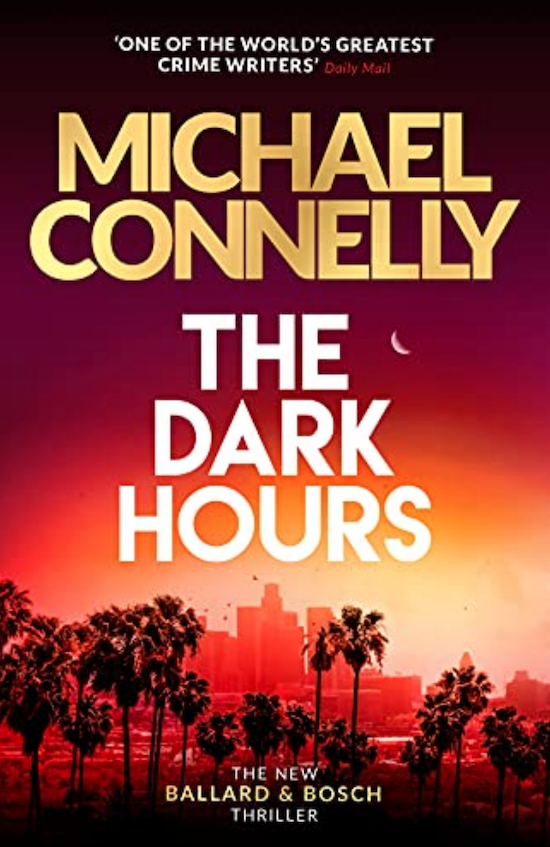
The story starts on New Year’s Eve 2020, and instantly transports the reader back to what may already feel – for many in the prosperous West, and Omicron notwithstanding – like that distant and distinct period when vaccines weren’t widely available and COVID was a silent killer stalking every community. But it’s also the point where the campaign to defund the police following the murder of George Floyd had reached a crescendo, with unintended and unimagined consequences both inside and outside the police force. The story carries on past January 6th, when the Capitol was stormed – an insurrection that may have happened on the other coast but which reverberated in LA as resoundingly as any earthquake.
Against this backdrop Ballard and Bosch work together to investigate two overlapping sets of crimes: a series of home-invasion rapes and a cold case linked to the New Year killing of a car mechanic. Connelly takes the conventional wisdom that you should show but not tell and turns it on its head: every piece of cop argot is explained to the reader, each assumption or background building-block carefully and very visibly slotted into the correct place. This is a passionate and often very angry book, but is written with deliberation, patience, and restraint throughout. The effect ought to be distancing, yet instead what happens is the reader gets drawn in by the clarity of the prose. Connelly assumes nothing beyond a genuine level of basic interest, and rewards that with a deeply involving and immersive depiction of a very specific time, place, and socio-political moment. He named Bosch after the Dutch painter famous for his visions of hell, and here we have a portrait of a society contending with catastrophe that is worthy of the comparison. Yet the book sings just as loudly of a love for the city and its people in all its (occasionally horrifying) multifaceted manifestations.
Sunset Swing brings Ray Celestin’s brilliant City Blues Quartet to an end in quite some style. This outstanding series has tracked its characters across four major American cities and over half a century, the histories of the Cosa Nostra and jazz music seeping through the pages to create a vast and densely populated landscape within which the separate dramas can play out. Each time, in what feels like a conscious nod to James Ellroy (an acknowledged influence on the entire series but more starkly evoked here, with the action in his own geographic and temporal back yard), British screenwriter Celestin has structured the stories as multi-stranded investigations where different people hold different pieces of the puzzle. Only when they finally converge, often having to set aside their preconceptions and work together even if the notion seems anathema, will a solution become apparent. This is very much the case again here, though everything seems to be writ larger as the overarching storyline reaches its conclusion. Each of the four books is an epic in its own right, but here, as winter wildfires rage at the end of the continent, the feel is almost apocalyptic.
A singular element of the attraction of the quartet has been Celestin’s involvement of Louis Armstrong as a major character, with each book taking place in a city and at a point in time where the jazz icon was busy making musical history. It may be fiction, and Celestin is fastidious in explaining (in the afterword) where his timeline departs from or distorts the historical record, but he arrives at something that feels as real and as true as anything you’d read by Thomas Brothers or Ricky Riccardi. Indeed, the section here where Amstrong is first confounded by, then finds a new way to understand and interpret, Bob Thiele’s lyrics for ‘What A Wonderful World’, is as fine and nuanced a piece of writing about music as you’ll find anywhere. It’s one of several superb and moving moments in the best book in a quite remarkable series. Start here if you want, but to get the full effect, put The Axeman’s Jazz, Dead Man’s Blues, and The Mobster’s Lament on your Christmas list as well. It would almost be a crime not to.

